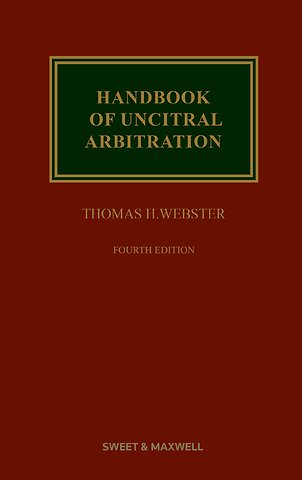Handbook of UNCITRAL Arbitration
Commentary, Precedents and Models for UNCITRAL-Based Arbitration Rules
Gebonden Engels 2023 4e druk 9780414100213Samenvatting
"The Handbook is a comprehensive and in-depth analysis of UNCITRAL arbitration. As with the prior editions, this fourth edition of the Handbook of UNCITRAL Arbitration will provide an invaluable contribution to UNCITRAL arbitration." - Anna Joubin-Bret, Secretary, UNCITRAL Director, International Trade Law Division United Nations
The Handbook of UNCITRAL Arbitration presents a practical, rule by rule guide to the UNCITRAL Arbitration Rules, offering in-depth commentary, analysis and support materials as used in both commercial and investment arbitration. It reviews each stage of the UNCITRAL arbitration process, from the arbitration clause, through the arbitral proceedings, to the award.
This highly anticipated fourth edition deals with the Rules as modified with the addition of the UNCITRAL Expedited Arbitration Rules that came into effect in September 2021.
International arbitration is evolving rapidly, and the Handbook provides an up-to-date analysis of key aspects of arbitration law applicable to UNCITRAL arbitration wherever conducted. It deals with issues such as:
The procedural issues for which a majority is required under art.33(1) of the Rules and those which the presiding arbitrator is entitled to decide on his or her own in the absence of a majority under art.33(2) of the Rules.
The obligations of collegiality within the Tribunal with respect to procedural decisions and awards.
The conduct of virtual procedural and substantive hearings, including case management conferences.
The due process issues relating to admission – or exclusion – of evidence and amendments to claims.
The role of the Appointing Authorities and in particular the role of the LCIA, ICC, SIAC and the Permanent Court of Arbitration.
The law applicable to the arbitration agreement. With a discussion of the varying and conflicting approaches reflected in Enka Insaat Ve Sanayi AS v. OOO Insurance Company Chubb & Ors [2020] UKSC 38 and Kabab-Ji SAL v Kout Food Group UK Supreme Court ([2021] UKSC 48 in the UK and Kabab-Ji in France (French Supreme Court Civ. 1iere of 28 September 2022)
The issue of joinder of non-signatories to an arbitration with particular reference to Dallah and Kabab-Ji (in the UK and France)
Whether the courts adopt a deferential or non-deferential approach to reviewing jurisdiction with reference in particular to the decisions in the UK and the USA.
Whether and how to challenge and arbitrator and the most recent challenge decisions, with an updated table of over 100 of such decisions.
The updated IBA Rules on the Taking of Evidence in International Arbitration as amended in 2020.
The US Supreme Court decision in ZF Automotive US, Inc. v. Luxshare, Ltd., 142 S.Ct. 2078 (2022) limiting the application of 28 USC §1782(a) regarding discovery in the United States in support of international arbitration.
The most recent approaches to interim measures, including security for costs.
The Handbook of UNCITRAL Arbitration is based on the author’s everyday practical experience in hundreds of arbitrations. It deals with the latest trends in international arbitration relating to issues such as the conduct of disclosure, the role of experts, the conduct of virtual hearings and other attempts to render international arbitration more expeditious and cost-effective.
Specificaties
Lezersrecensies
Inhoudsopgave
INTRODUCTION
Introductory remarks
A. Structure of the Handbook
Part I: Commentary on the Rules and the Expedited Arbitration Rules
Part II: Commentary on the UNCITRAL Rules on Transparency in Treaty-based Investor-State Arbitration/Convention on Transparency in Treaty-based Investor-State Arbitration
Part III: Supporting material
B. Background to the Rules
Context of the Rules
C.International ad hoc arbitration
Ad hoc and institutional arbitration
Appointing authorities
D. Current trends in international arbitration
E. Further issues to be addressed
INTRODUCTORY RULES
Introductory remarks for Section I: Introductory Rules
Article 1 Scope of Application
Article 2 Notice and Calculation of Periods of Time
Article 3 Notice of Arbitration
Article 4 Response to the Notice of Arbitration
Article 5 Representation and Assistance
Article 6 Designating and Appointing Authorities
COMPOSITION OF THE ARBITRAL TRIBUNAL
Introductory remarks for Section II
Article 7 Number of Arbitrators
Article 8 Appointment of arbitrators (articles 8 to 10)
Disclosures by and Challenge of Arbitrators (Articles 11 to 13)
Article 14 Replacement of an Arbitrator
Article 15 Repetition of hearings in the event of the replacement of an arbitrator
Article 16 Exclusion of liability
ARBITRAL PROCEEDINGS
Introductory remarks with respect to Section III
Article 17 General Provisions
Article 18 Place of Arbitration
Article 19 Language
Article 20 Statement of Claim
Article 21 Statement of Defence
Article 22 Amendments to the Claim or Defence
Article 23 Pleas as to the Jurisdiction of the Arbitral Tribunal
Article 24 Further Written Statements
Article 25 Periods of Time
Article 26 Interim Measures
Article 27 Evidence
Article 28 Hearings
Article 29 Experts Appointed by the Arbitral Tribunal
Article 30 Default
Article 31 Closure of Hearings
Article 32 Waiver of Right to Object
THE AWARD
Introductory remarks to Section IV
Article 33 Decisions
Article 34 Form and Effect of the Award
Article 35 Applicable Law, Amiable Compositeur
Article 36 Settlement or Other Grounds for Termination
Article 37 Interpretation of the Award
Article 38 Correction of the Award
Article 39 Additional Award
Article 40 Definition of Costs
Article 41 Fees and Expenses of Arbitrators
Article 42 Allocation of Costs
Article 43 Deposit of Costs
Part II - UNCITRAL Rules on Transparency in Treaty-Based Investor-State Arbitration
Introductory remarks
Article 1(4) of the UNCITRAL Arbitration Rules
Rules on Transparency
The Convention on Transparency
Part III - Appendices and Supporting Material
Anderen die dit boek kochten, kochten ook
Rubrieken
- advisering
- algemeen management
- coaching en trainen
- communicatie en media
- economie
- financieel management
- inkoop en logistiek
- internet en social media
- it-management / ict
- juridisch
- leiderschap
- marketing
- mens en maatschappij
- non-profit
- ondernemen
- organisatiekunde
- personal finance
- personeelsmanagement
- persoonlijke effectiviteit
- projectmanagement
- psychologie
- reclame en verkoop
- strategisch management
- verandermanagement
- werk en loopbaan







